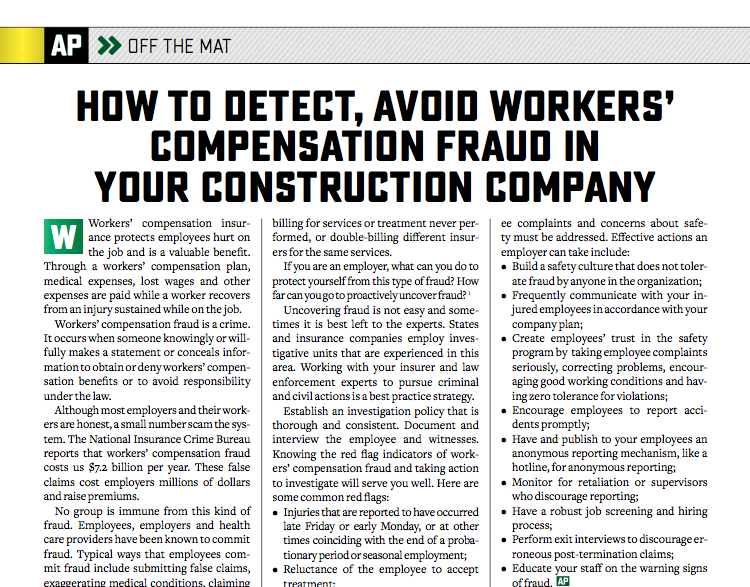How to Detect Worker’s Compensation Fraud in Your Construction Company
BY Lorraine D'Angelo

Workers’ compensation insurance protects employees hurt on the job and is a valuable benefit. Through a workers’ compensation plan, medical expenses, lost wages and other expenses are paid while a worker recovers from an injury sustained while on the job.
Workers’ compensation fraud is a crime. It occurs when someone knowingly or willfully makes a statement or conceals information to obtain or deny workers’ compensation benefits or to avoid responsibility under the law.
Although most employers and their workers are honest, a small number scam the system. The National Insurance Crime Bureau reports that workers’ compensation fraud costs us $7.2 billion per year. These false claims cost employers millions of dollars and raise premiums.
No group is immune from this kind of fraud. Employees, employers and health care providers have been known to commit fraud. Typical ways that employees commit fraud include submitting false claims, exaggerating medical conditions, claiming an off-the-job injury took place on-the-job, or by working while injured or disabled. An employer commits fraud by underreporting or misclassifying employees to pay lower insurance premiums, deducting premium dollars from an employee’s wages, or by failing to have the required coverages. Health care providers typically commit fraud by providing unnecessary treatment, billing for services or treatment never performed, or double-billing different insurers for the same services.
If you are an employer, what can you do to protect yourself from this type of fraud? How far can you go to proactively uncover fraud?[1]
Uncovering fraud is not easy and sometimes it is best left to the experts. States and insurance companies employ investigative units that are experienced in this area. Working with your insurer and law enforcement experts to pursue criminal and civil actions is a best practice strategy.
Establish an investigation policy that is thorough and consistent. Document and interview the employee and witnesses. Knowing the red flag indicators of workers’ compensation fraud and taking action to investigate will serve you well. Here are some common red flags:
- Injuries that are reported to have occurred late Friday or early Monday, or at other times coinciding with the end of a probationary period or seasonal employment;
- Reluctance of the employee to accept treatment;
- No witnesses to the accident;
- Conflicting reports regarding the accident;
- The employee is outside his usual work space;
- Untimely reporting;
- Documentation that contains irregularities or inconsistencies;
- The employee has financial problems;
- Employee history of frequent job changes or poor attendance record;
- Details about the accident are vague or the report lacks detail;
- Employee is involved in physical hobbies or sports.
The most effective strategy for an employer is to create a strong safety program that does not tolerate violations. Employee complaints and concerns about safety must be addressed. Effective actions an employer can take include:
- Build a safety culture that does not tolerate fraud by anyone in the organization;
- Frequently communicate with your injured employees in accordance with your company plan;
- Create employees’ trust in the safety program by taking employee complaints seriously, correcting problems, encouraging good working conditions and having zero tolerance for violations;
- Encourage employees to report accidents promptly;
- Have and publish to your employees an anonymous reporting mechanism, like a hotline, for anonymous reporting;
- Monitor for retaliation or supervisors who discourage reporting;
- Have a robust job screening and hiring process;
- Perform exit interviews to discourage erroneous post-termination claims;
- Educate your staff on the warning signs of fraud.
 Lorraine D’Angelo, a nationally-recognized expert on legal and regulatory risk management, is the president of LDA Compliance Consulting Inc. She has more than 25 years’ experience in the construction industry, including a recent tenure as senior vice president for ethics and compliance at a global construction company. D’Angelo is an accredited ethics and compliance professional and a leading expert on small, women-owned, minority and DBE matters, programs and policy implementation. For more information, contact her at (914) 548-6369 or Lorraine@ldacomplianceconsulting.com.
Lorraine D’Angelo, a nationally-recognized expert on legal and regulatory risk management, is the president of LDA Compliance Consulting Inc. She has more than 25 years’ experience in the construction industry, including a recent tenure as senior vice president for ethics and compliance at a global construction company. D’Angelo is an accredited ethics and compliance professional and a leading expert on small, women-owned, minority and DBE matters, programs and policy implementation. For more information, contact her at (914) 548-6369 or Lorraine@ldacomplianceconsulting.com.
[1] This information is provided for general information only and does not constitute legal advice. Laws and regulations vary from state to state. You should always consult an attorney in your jurisdiction for the laws and rules that particularly apply to you and your business.
